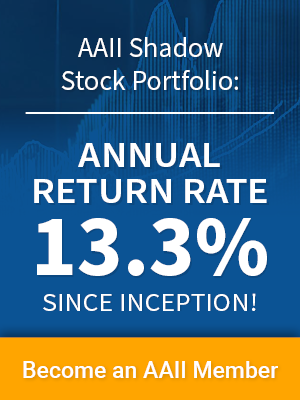Based on key financial metrics such as the price-to-sales ratio, shareholder yield and the price-earnings ratio, the following 3 stocks made the list for top value stocks in the Machinery industry. Those looking for value stocks to add to their portfolio may want to use this list as a starting point for further investment research.
Why Focus on Undervalued Machinery Stocks?
Value investors seek to buy stocks at a discount to their intrinsic value. Long-term returns show that such strategies are advantageous. Value stocks, as a group, tend to outperform growth stocks over extended periods of time. Typically, value investors perform financial analysis of numerous metrics, don’t follow the herd and are long-term investors.
AAII’s A+ Investor Value Grade is derived from a stock’s Value Score. The Value Score is the percentile rank of the average of the percentile ranks of the price-to-sales ratio, price-earnings ratio, enterprise-value-to-EBITDA (EV/EBITDA) ratio, shareholder yield, price-to-book-value ratio and price-to-free-cash-flow ratio. The score is variable, meaning it can consider all six ratios or, should any of the six ratios not be valid, the remaining ratios that are valid. To be assigned a Value Score, stocks must have a valid (non-null) ratio and corresponding ranking for at least two of the six valuation ratios.
What Goes Into AAII’s Value Grade?
Stock evaluation requires access to huge amounts of data as well as the knowledge and time to sift through it all, make sense of financial ratios, read income statements and analyze recent stock movement. AAII created A+ Investor, a robust data suite that condenses data research in an actionable and customizable way suitable for investors of all knowledge levels, to help investors with that task.
AAII’s proprietary stock grades come with A+ Investor. These offer intuitive A–F grades for more than just value. It is possible for a stock to appear cheap based on one valuation metric but appear expensive on another. It is also possible for one valuation ratio to be associated with outperforming stocks during certain periods of time but not others. Some stocks may even have null values for certain metrics like the price-earnings ratio or the price-to-book ratio but not others. An example of this would be a company with losses instead of profits or a negative book value because of heavy borrowing. Negative earnings or book value result in non-meaningful ratios that are left blank or null.
Click the button below to learn more about A+ Investor and subscribe today.

3 Undervalued Machinery Stocks
Of course, there are countless value stocks that are worth mentioning, but this is a concise list of the top 3 undervalued stocks in the Machinery industry for Tuesday, November 18, 2025. Let’s take a closer look at their individual scores to see how they measure up against each other and the Machinery industry median.
| Company | Ticker | Price/Sales | Price/Earnings | EV/EBITDA | Shareholder Yield | Price/Book Value | Price/Free Cash Flow | Value Grade |
| AGCO Corporation | AGCO | 0.76 | 20.5 | 17.1 | 3.6% | 1.71 | 11.6 | B |
| The Timken Company | TKR | 1.14 | 17.6 | 12.2 | 2.6% | 1.65 | 17.8 | B |
| Trinity Industries, Inc. | TRN | 0.94 | 20.3 | 12.6 | 6.9% | 2.01 | na | B |
The Value Grade is assigned based on how each stock’s composite valuation compares to all other stocks.
The process for assigning grades starts with each variable for a given stock. The percentile rankings for all valid ratios that a stock has are calculated. So, for instance, a stock could have a price-to-book ranking in the 43rd percentile, a price-earnings ranking in the 67th percentile, a price-to-sales ranking in the 23rd percentile, etc. Then, those rankings are averaged for each stock. (A minimum of two valid variables are required, though all six will be used if available.)
Once the average of the individual variables is calculated, that average is ranked against all stocks. Put another way, each stock’s composite valuation is compared to all other stocks. These ranks are then sorted into quintiles from the cheapest 20% (a grade of A) to the most expensive 20% (a grade of F).
As always, we recommend that you conduct proper due diligence and research before investing in any security. We also suggest that investors utilize numerous grades, not just value, when it comes to deciding whether a company is a good fit for their allocation needs.
AGCO Corporation’s Value Grade
Value Grade:
| Metric | Score | AGCO | Industry Median |
| Price/Sales | 27 | 0.76 | 1.71 |
| Price/Earnings | 54 | 20.5 | 24.2 |
| EV/EBITDA | 68 | 17.1 | 14.1 |
| Shareholder Yield | 23 | 3.6% | 0.9% |
| Price/Book Value | 48 | 1.71 | 2.42 |
| Price/Free Cash Flow | 31 | 11.6 | 25.0 |
AGCO Corporation manufactures and distributes agricultural equipment and replacement parts worldwide. It offers horsepower tractors for row crop production, soil cultivation, planting, land leveling, seeding, and commercial hay operations; utility tractors for small- and medium-sized farms, as well as for dairy, livestock, orchards, and vineyards; and compact tractors for small farms, specialty agricultural industries, landscaping, equestrian, and residential uses. The company also provides grain storage bins and related drying and handling equipment systems; seed-processing systems; swine and poultry feed storage and delivery; ventilation and watering systems; and egg production systems and broiler production equipment. In addition, it offers round and rectangular balers, loader wagons, self-propelled windrowers, forage harvesters, disc mowers, spreaders, rakes, tedders, and mower conditioners for harvesting and packaging vegetative feeds used in cattle, dairy, horse, and renewable fuel industries. Further, the company provides implements, including disc harrows leveling seed beds and mixing chemicals with the soils; heavy tillage to break up soil and mix crop residue into topsoil; field cultivators that prepare smooth seed bed and destroy weeds; drills for small grain seeding; planters and other planting equipment; and loaders. Additionally, it offers combines for harvesting grain crops, such as corn, wheat, soybeans, and rice; and application equipment, such as self-propelled, three- and four-wheeled vehicles, and related equipment for liquid and dry fertilizers and crop protection chemicals, and for after crops emerge from the ground, as well as produces diesel engines, gears, and generating sets. The company markets its products under the Fendt, Massey Ferguson, PTx, and Valtra brands through a network of independent dealers and distributors. AGCO Corporation was founded in 1990 and is headquartered in Duluth, Georgia.
Stocks with a Value Score from 81 to 100 are considered deep value, those with a score between 61 and 80 are value and so on.
AGCO Corporation has a Value Score of 61, which is considered to be undervalued.
When you look at AGCO Corporation’s price-to-sales ratio at 0.76 compared to the industry median at 1.71, this company has a lower price relative to revenue compared to its peers. This could make AGCO Corporation’s stock more attractive for value investors.
AGCO Corporation’s price-earnings ratio is 20.50 compared to the industry median at 24.20. This means it has a lower share price relative to earnings compared to its peers. This could make AGCO Corporation more attractive for value investors.
Now, let’s assess AGCO Corporation’s EV/EBITDA ratio, also known as enterprise multiple. At 17.1, when compared to the industry median of 14.1, the company may be considered overvalued in relation to its peers. Value investors could use the enterprise multiple to identify stocks that are considered overvalued or undervalued relative to their industry.
Shareholder yield is the sum of a stock’s dividend yield (paid over previous 12 months minus special dividends) and the percentage of net share buybacks over the previous 12 months. AGCO Corporation’s shareholder yield is higher than its industry median ratio of 0.90%. Value investors may look for an attractive shareholder yield because it can be a powerful tool for identifying if the company has a good management team.
As one of the most common value metrics, the price-to-book ratio evaluates a company’s current market price relative to its book value. AGCO Corporation’s price-to-book ratio is lower than its industry median ratio of 2.42. This could make AGCO Corporation more attractive to investors looking for a new addition to their portfolio.
Lastly, let’s take a look at AGCO Corporation’s price-to-free-cash-flow ratio (P/FCF), which can indicate a company’s market value relative to its operating cash flow. AGCO Corporation’s price-to-free-cash-flow ratio is lower than its industry median ratio of 25.00. This could make AGCO Corporation more attractive because the lower P/FCF ratio indicates that AGCO Corporation is undervalued. The P/FCF ratio metric can also be viewed over a long-term time frame to see if the company's cash flow to share price value is generally improving or worsening.
The Timken Company’s Value Grade
Value Grade:
| Metric | Score | TKR | Industry Median |
| Price/Sales | 36 | 1.14 | 1.71 |
| Price/Earnings | 46 | 17.6 | 24.2 |
| EV/EBITDA | 47 | 12.2 | 14.1 |
| Shareholder Yield | 29 | 2.6% | 0.9% |
| Price/Book Value | 46 | 1.65 | 2.42 |
| Price/Free Cash Flow | 47 | 17.8 | 25.0 |
The Timken Company designs, manufactures, and sells engineered bearings and industrial motion products, and related services in the United States and internationally. The company operates in two segments, Engineered Bearings and Industrial Motion. The Engineered Bearings segment provides various bearing products, including tapered, spherical, and cylindrical roller bearings; plain bearings, metal-polymer bearings, and rod end bearings; radial, angular, and precision ball bearings; thrust and specialty ball bearings; journal bearings; and housed or mounted bearings. This segment serves wind energy, agriculture, construction, food and beverage, metals and mining, automotive and truck, aerospace, rail, and other industries under the Timken, GGB, and Fafnir brands. The Industrial Motion segment offers a portfolio of engineered products, such as industrial drives, automatic lubrication systems, linear motion products and systems, chains, belts, couplings, filtration systems, seals, and industrial clutches and brakes, as well as provides industrial drivetrain and bearing repairing services. This segment serves a range of industries comprising solar energy, automation, construction, agriculture and turf, passenger rail, marine, aerospace, packaging and logistics, medical, and others under the Philadelphia Gear, Cone Drive, Rollon, Nadella, Groeneveld, BEKA, Diamond, Drives, Timken Belts, Spinea, Des-Case, Lagersmit, Lovejoy, CGI, and PT Tech brands. The company was founded in 1899 and is headquartered in North Canton, Ohio.
Stocks with a Value Score from 81 to 100 are considered deep value, those with a score between 61 and 80 are value and so on.
The Timken Company has a Value Score of 61, which is considered to be undervalued.
The Timken Company’s price-earnings ratio is 17.6 compared to the industry median at 24.2. This means that it has a lower price relative to its earnings compared to its peers. This makes The Timken Company more attractive for value investors.
The Timken Company’s price-to-book ratio is higher than its peers. This could make The Timken Company less attractive for value investors when compared to the industry median at 2.42.
You can read more about The Timken Company’s key financial metrics like shareholder yield, price-to-free-cash-flow and EV/EBITDA ratio, or learn more about its Momentum and Growth Grades, by subscribing to A+ Investor.
Trinity Industries, Inc.’s Value Grade
Value Grade:
| Metric | Score | TRN | Industry Median |
| Price/Sales | 32 | 0.94 | 1.71 |
| Price/Earnings | 54 | 20.3 | 24.2 |
| EV/EBITDA | 49 | 12.6 | 14.1 |
| Shareholder Yield | 10 | 6.9% | 0.9% |
| Price/Book Value | 53 | 2.01 | 2.42 |
| Price/Free Cash Flow | na | na | 25.0 |
Trinity Industries, Inc. provides railcar products and services under the TrinityRail trade name in North America. It operates in two segments, Railcar Leasing and Services Group, and Rail Products Group. The Railcar Leasing and Services Group segment leases freight and tank railcars; originates and manages railcar leases for third-party investors; and provides fleet leasing, management, and administrative services, as well as railcar maintenance and modification services, and other railcar logistics products and services. As of December 31, 2023, it had a fleet of 109,635 railcars. This segment serves industrial shipper and railroad companies operating in agriculture, construction and metals, consumer products, energy, and refined products and chemicals markets. The Rail Products Group segment manufactures freight and tank railcars for transporting various liquids, gases, and dry cargo; and manufactures and sells railcars and related parts and components. This segment serves railroads, leasing companies, and industrial shippers of products in the refined products and chemicals, energy, agriculture, construction and metals, and consumer products markets. It sells or leases products and services through its own sales personnel and independent sales representatives. The company was incorporated in 1933 and is headquartered in Dallas, Texas.
Stocks with a Value Score from 81 to 100 are considered deep value, those with a score between 61 and 80 are value and so on.
Trinity Industries, Inc. has a Value Score of 65, which is considered to be undervalued.
Trinity Industries, Inc.’s price-earnings ratio is 20.3 compared to the industry median at 24.2. This means that it has a lower price relative to its earnings compared to its peers. This makes Trinity Industries, Inc. more attractive for value investors.
Trinity Industries, Inc.’s price-to-book ratio is higher than its peers. This could make Trinity Industries, Inc. less attractive for value investors when compared to the industry median at 2.42.
You can read more about Trinity Industries, Inc.’s key financial metrics like shareholder yield, price-to-free-cash-flow and EV/EBITDA ratio, or learn more about its Momentum and Growth Grades, by subscribing to A+ Investor.

Other Machinery Stock Grades
Value is just one of the five Stock Grades included in our A+ Investor service. AAII members can see the top-graded stocks—those with grades of A or B for value, growth, momentum, earnings estimate revisions and quality—on the A+ Stock Grades Screener.
Also, if you want full access to all of AAII’s premium services, you can subscribe to one convenient bundled plan called AAII Platinum where you can try out A+ Investor, AAII Dividend Investing, the Stock Superstars Report, Growth Investing and VMQ Stocks. With the other premium services, you can dive deep into additional metrics, portfolios, commentary and information about Machinery stocks as well as other industrys.
Choosing Which of the 3 Best Machinery Stocks Is Right for You
Choosing which value stocks to invest in will ultimately depend on your individual goals and allocation; however, comparing similar value stocks in the same industry can help you analyze which might be better investments for you in the long run. So, let’s take a look at the Value Grade for all of our stocks.
- AGCO Corporation stock has a Value Grade of B.
- The Timken Company stock has a Value Grade of B.
- Trinity Industries, Inc. stock has a Value Grade of B.
Now that you have a bit more background about each of the 3 undervalued stocks in the Machinery industry as well as their overall grades, it’s time for you to conduct additional research to see if these could fit your portfolio needs based on your goals and risk tolerance. AAII can help you figure out both and identify which investments align with what works best for you.
We do so through a program of education that teaches you to invest for yourself and become an effective manager of your own wealth—no more relying on others for your financial independence. You can rely on AAII for timeless articles on financial planning and stock-picking, unbiased research and actionable analysis that makes you a better investor.
A+ Investor adds to that qualitative teaching by giving you a powerful data suite that helps you whittle down investment decisions to find stocks, exchange-traded funds (ETFs) or mutual funds that meet your needs.

Additional Resources About Machinery Stocks
Want to learn more about Machinery stocks to see if they could be the right investment for you? Check out some additional resources and articles to help you on your financial journey.
- 3 Undervalued Machinery Stocks for Tuesday, November 18
- Is Caterpillar Inc. (CAT) Overvalued?
- Is Deere & Company (DE) Overvalued?
- Which Is a Better Investment, Hillenbrand, Inc. or Stanley Black & Decker, Inc. Stock?
AAII Disclaimer
We make no representations or warranties that any investor will, or is likely to, achieve profits similar to those shown, because past, hypothetical or simulated performance is not necessarily indicative of future results. Before making an investment decision, you should consider your circumstances and whether the information on our content is applicable to your situation. This information was prepared in good faith and we accept no liability for any errors or omissions. The full disclaimer can be read here.
 Included With AAII Platinum
Included With AAII Platinum
at only 6.9%
Since Inception. Data as of 12/31/2024.

769.3% Stock Superstars Portfolio Total Return Since Inception

U.S. Index ETF (IYY)
SSR Group 3 O'Shaughnessy portfolio has a 411.2% gain since inception performance compared to IYY at only 119.1%% Performance as of 11/29/24.
FREE REPORT

BECOME A MEMBER FOR ONLY $2
Get access to powerful investment discovery tools and a wealth of investment education to help you achieve your financial goals.




